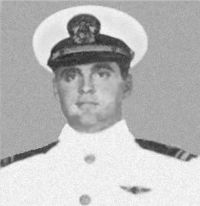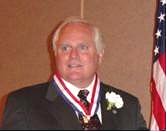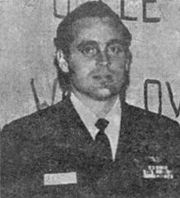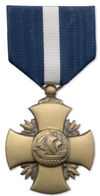George Thomas Coker
2008/9 Schools Wikipedia Selection. Related subjects: Military People
| George Thomas Coker | |
|---|---|
| Born July 14, 1943 | |
 May 1966 |
|
| Place of birth | Amarillo, Texas |
| Allegiance | United States of America |
| Service/branch | United States Navy |
| Years of service | 1963–1986 |
| Rank | Commander |
| Unit | Attack Squadron 65, USS Constellation |
| Battles/wars | Vietnam War |
| Awards | Navy Cross Silver Star Legion of Merit Distinguished Flying Cross Bronze Star (2) Purple Heart (2) POW Medal |
| Other work | Distinguished Eagle Scout |
George Thomas Coker (born July 14, 1943) is a retired US Navy commander, honored with the Navy Cross for his leadership as a prisoner of war (POW) during the Vietnam War, and a Distinguished Eagle Scout noted for his devotion to Scouting.
In 1966, the A-6 Intruder on which Coker was serving as bombardier–navigator was shot down over North Vietnam. He was held as a prisoner of war in the " Hanoi Hilton" and other camps for 6.5 years (1966–1973). After his release, he continued to serve in the Navy until his retirement in 1986. He also returned to active participation in Scouting.
Personal information
George Coker was born in Amarillo, Texas in 1943. In 1951, his family moved to Linden, New Jersey, where he became a New Jersey high school state wrestling champion in the 142 lb weight class and played high school varsity football. Coker attended Rutgers University from 1961–1963, where he also wrestled. While at Rutgers, he participated in an aviation officer cadet program and was commissioned an Ensign in the United States Navy. After his release from Vietnam, he returned to college to complete his degree. He graduated from the University of San Diego in 1976 with a BS in political science and then studied education and mathematics at Old Dominion University from 1982–1986. Coker is married and has two daughters and a son.
Scouting life
Coker grew up in Linden, New Jersey and became an Eagle Scout in Troop 32 of Saint Elizabeth's Catholic Church in Linden on January 27, 1959. His passion for Scouting is one of the things that got him through his 6.5 years as a POW in North Vietnam, and he states that it is what got him through his darkest days in the POW camps – to the point that at times all he could remember was the Scout Oath, but not even the names of his family members.
Both of Coker's older brothers were involved in Scouting and Coker first became involved when he joined Cub Scouts in late 1951. He completed the Cubbing program and joined Troop 32. Troop 32 had about a dozen members at that time but had over 60 members when Coker made Eagle Scout in 1959. During this time the troop formed an Explorer Post and Sea Scout unit. After making Eagle Scout, Coker joined the Sea Scout unit and worked at summer camp before the joined the Navy in October 1963. When Coker returned to Linden after being released from captivity, the Scouts were his biggest supporter. Troop 32 now had over 100 members. Local citizens turned out by the hundreds to greet him. Coker visited many of the local Scouting units. Coker was then inactive in Scouting during a busy Naval career, but got involved again when his son joined Cub Scouts as a Tiger Cub after the family had settled in Virginia Beach, Virginia. He became the den leader of 7 boys, all of whom earned their Arrow of Light, the highest recognition in Cub Scouting. They moved on to Troop 62, Virginia Beach, in May 1994; with five of them later becoming Eagle Scouts, including his son.
Troop 62's adults asked Coker to become Scoutmaster, a position in which he served for several years. Coker is also a Vigil Honour member of the Order of the Arrow (OA). Coker served as the lodge adviser for Tidewater Council's OA lodge, Blue Heron Lodge, from December 2005 until December 2007. He was honored by the Boy Scouts of America with their Distinguished Eagle Scout Award on August 09, 2005.
Military service
Coker served as a naval aviation officer for 23 years in the United States Navy from 1963–1986. He was serving as a Bombardier–Navigator of an A-6A Intruder from squadron VA-65 operating from the USS Constellation (CV-64), when he and his pilot, John H. "Jack" Fellowes, were shot down over North Vietnam on August 27, 1966 and immediately captured. During his captivity, Coker was notable for the ferocity with which he resisted his incarceration. On March 4, 1973, both Coker and Fellowes were released as part of Operation Homecoming.
Coker was considered one of "the baddest of the baddest" of the POWs, a reference to his stubborn resistance to his captivity. Coker and Air Force Captain George McKnight (another of the "baddest") were cellmates for a while and were the only POWs to ever escape from the Hao Lo Prison (" Hanoi Hilton"). They swam down the Red River, hid in the mud, and were recaptured 12 1/2 hours later. Coker received the Navy Cross for his action; the citation reads in part:
- ...for extraordinary heroism during an extremely daring escape from a solitary confinement cell while a Prisoner of War in Hanoi, North Vietnam on 12 October 1967. During a period of particularly harsh treatment, Lieutenant Commander Coker and another prisoner executed an escape as a two-man team despite the high risk of brutal reprisal or possible loss of life. That night, after opening the cell door by removing door bolt brackets from inside the room, he proceeded over the wall and through several blocks of housing to the Domer Bridge. Walking under the bridge to the Red River's edge, he swam downstream all night and at sunrise buried himself in a mudbank in an effort to remain concealed. He was later discovered, recaptured, severely beaten for many hours, and banished to solitary confinement for two and a half years.
Vietnam-era POWs were released in order of capture. Fellowes and Coker were in the second large release group and were about #123 and #124. Of their 2,382 days in captivity (6.5 years), 2.5 years were in solitary confinement and 2.5 years in the "Hanoi Hilton". They also spent time in several other POW camps around Hanoi.
A fellow POW, CDR Paul Galanti, said "George is one of my heroes...but the real reason we're home is the bad guys wanted to get Coker out of the country. So, you see, George Coker is the real reason we were released." In a scene from the 2005 movie Faith of My Fathers, a biography of future Senator John McCain, McCain's character attempts to memorize the names of fellow POWs. Coker is one of the names he recites in the movie and book. Coker was also shown making patriotic speeches and controversial statements about the Vietnamese in the Academy Award-winning documentary Hearts and Minds.
Military decorations
- Navy Cross
- Silver Star
- Legion of Merit + Combat V
- Distinguished Flying Cross
- Bronze Star, two, + Combat V
- Purple Heart, two
- Meritorious Service Medal
- Air Medal, five
- Navy Commendation, three, + Combat V
- Combat Action Ribbon
- Navy Unit Commendation
- POW Medal
- National Defense Service Medal
- Vietnam Service Medal
In retirement
In addition to continued Scouting activities, Coker has been involved in supporting ex-POWs for many years. In December 2004, he was elected Commander of his local POW chapter, the Tidewater ex-POW Association. Coker and his wife are also active in church and civic activities, such as counseling young married couples.


